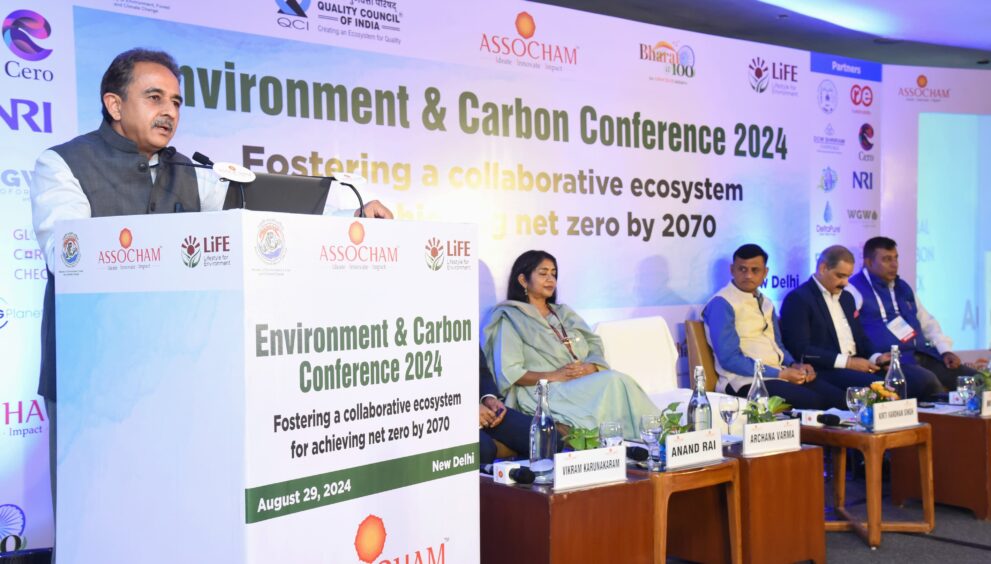India Surpasses Emission Intensity Target, Eyes Net-Zero By 2070: MoS Kirti Vardhan Singh

India has already surpassed its Nationally Determined Contribution (NDC) target for reducing emission intensity, originally set at 33 per cent by 2030, according to Shri Kirti Vardhan Singh, Minister of State, Ministry of Environment, Forest and Climate Change. Speaking at the Assocham Environment and Carbon Conference, Singh highlighted the government’s active role in achieving net-zero emissions under the Viksit Bharat 2047 initiative.
Singh said the global nature of climate change, noting that its impacts transcend political and national borders. “Our country heavily relies on agriculture, making climate change a boundary-less issue that affects everyone. While we are working towards our NDC targets, our progress is also linked to global actions,” he said. Singh pointed to India’s achievements in emission intensity and non-fossil fuel capacity, stating, “We have already reached 40 per cent of our electrical installed capacity through non-fossil fuel sources—nine years ahead of our target.”
Addressing the challenges, Singh acknowledged the need for advanced technology to drive India’s climate goals. “A circular economy and waste-to-wealth initiatives are crucial, but we lack the necessary cutting-edge technology. Our research must focus on developing technologies for greener industries and low-carbon emissions.”
Archana Varma, Mission Director of the National Water Mission under the Ministry of Jal Shakti, underscored India’s historically low carbon footprint, contributing just 4 per cent of global CO2 emissions despite housing 18 per cent of the world’s population. She highlighted key initiatives like the Jal Jeevan Mission, which has already provided drinking water to over 14 crore rural households, and the National Mission for Clean Ganga, aimed at reducing pollution in the river. Varma emphasised the role of water management in achieving net-zero goals, stating, “Efficient water use and conservation can significantly reduce energy consumption and enhance carbon sequestration.”
Milind Deore, Secretary of the Bureau of Energy Efficiency, highlighted India’s progress in energy efficiency. “Energy efficiency should be our top priority. Programs like the UJALA scheme and fuel efficiency standards have helped save 306 billion units of electricity in 2022-23, which accounts for 6.6 per cent of India’s primary consumption,” Deore said. He stressed that energy transition should be obligatory, noting that 60 per cent of the NDC target can be met through energy efficiency alone.
Masood Mallick, CEO of Re Sustainability, discussed India’s ambitious goal of achieving net-zero emissions by 2070. He outlined five key pathways, including expanding renewable energy to 500 GW by 2030 and 1000 GW by 2040. Mallick also noted India’s progress in reducing energy intensity by 40 per cent from 2005 levels by 2030 and its goal of 30 per cent electric vehicle penetration by the same year.
Vikram Karunakaram, Managing Director of Deltapure, spoke on the challenges of balancing ambitious decarbonisation goals with economic growth. He highlighted the importance of water management and clean energy sources in curbing carbon emissions.
In his closing remarks, Anand Rai, Vice President and Head of Sustainability at JSW, said the broader vision of Viksit Bharat. “Achieving net-zero emissions is not just an environmental goal but a cornerstone of our nation’s sustainable development. A Net Zero Bharat will lead by example, combining traditional wisdom with modern innovation for a thriving economy and a healthy environment,” Rai concluded.



















































































































































































































































































































































































































































































































































































































































































































































































































































